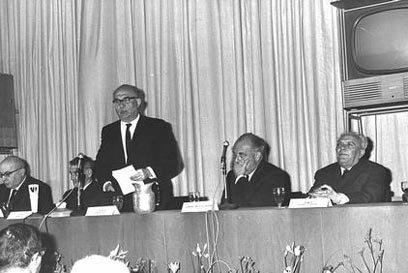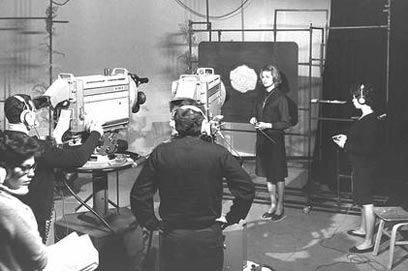
Good evening from Jerusalem
We didn't always have a multitude of channels just a click of a button away. Yossi Nahmias recaps the birth of Israeli television
The process of introducing the televised broadcast in Israel would have made any thriller-lover delighted, done partly in stealth, partly as a named mission, as if it was an undercover operation in the days of the British Mandate in Palestine.
Almost 20 years passed from the day Israel was established to the first broadcast by Israel's Educational Television. Two decades in which the young nation leaped forward, drying swamplands, building cities, instating governmental bureaus and bringing immigrants to their homeland, but when it came to instating television broadcasts – nothing. Nada. Zilch.
Israel was left far behind, trailing not only after the world's richest countries, but behind it neighbors. It was like then-Prime Minister David Ben-Gurion was doing all he could to prevent progress, all while his closest advisors were trying to come up with a way to sugarcoat the pill, to make him see the proverbial light.
In the early 1950s, in the midst of heated discussions for and against television in Israel, the powers at be realized that in the absence of televised broadcasts, Israel was losing hold of a potential strategic asset in the fight for public opinion in the Middle East and around the world.
Then-IDF Chief of Staff Yigael Yadin began exploring the possibility of forming a military television station. Israeli intelligence recognized the medium's potential in reaching the Arab Israeli sector and wanted to utilize it to the nation's advantage.

Prime Minister Eshkol speaking at the Educational Television inaugural ceremony (Archive photo: GPO)
The real change came in the early 1960s: The number of TV sets in the country was still minor, but as more and more rooftops started sprouting antennas, there was no longer a point in deferring the issue.
In 1962 Ben-Gurion finally warmed up to the idea of instating the Educational Television: The Rothschild Foundation agreed to fund small-scaled broadcasts for the school system. The network, stipulated the foundation, was not to broadcast news, commercials or entertainment content.
Ironically enough, even before the nature of Israeli television was determined as "educational", "military", or "general", before even one program went on the air, the government already began going after "Television owners that were avoiding paying the television tax." The government decided to tax television sets with an annual 50-Israel pound fee and Inspectors were sent to locate rebellious TV owners, who were facing criminal charges if they did not pay up.
The revenues from the TV tax were said to be funneled towards building the Israeli Television's facilities and training its personnel.
The real felon, however, proved to be the government, which tried imposing an illegal tax on the citizens, since if it didn't provide television broadcasts, how could it charge taxes for them?
'Good morning Israel'
In January of 1966, the Israeli Educational Television began its trial broadcast. The first official broadcast was expected to go on the air on March 24 – broadcasting a math lesson. The entire country seemed to be holding its breath in anticipation.
On the morning of March 25, newspapers reported on how "in one push of a button, Prime Minister Levi Eshkol ushered in the television broadcast." Then-Education Minister Zalman Aran expressed his hopes that "this marvelous device will help us improve educational achievements."

Broadcasting a biology lesson. The Educational Television (Archive photo: GPO)
A year on, and the Educational Television was nearly nationalized in favor of the Six Day War effort. Eventually, and while the preparations for launching emergency broadcast were speedily underway, the war ended.
Regardless, in the following months the government made a series of decisions which shaped the future of Israeli television in the budding nation: The first was to make sure that in case of national emergency, emergency broadcasts will be instated immediately through Educational Television broadcasts. The second called for pushing through various amendments to the Israel Broadcasting Authority Act, regulating, among other, the TV tax; and third, the government ordered to push forward on forming general television broadcasts.
And so, after years of procrastinating, the green light was given. Battle of the broadcasts had begun.










